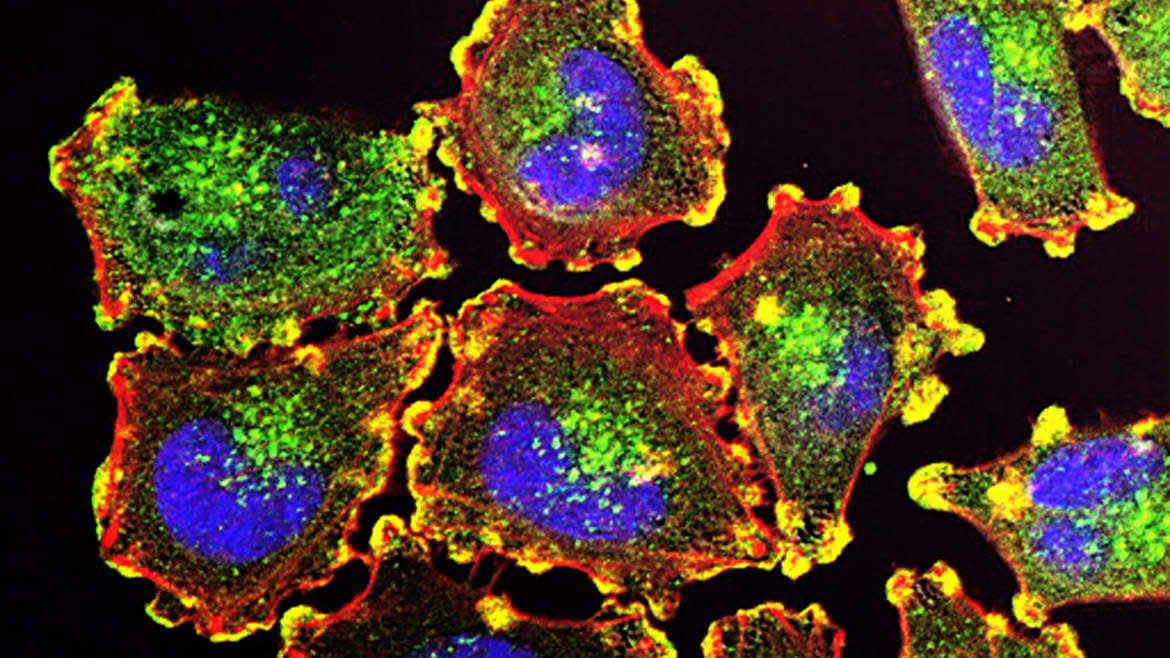This New Drug Turns Cancer’s Secret Addiction Against Itself

While the cells making up the tissues and organs in your body are pretty neighborly, cancer is the person who parks in your parking spot and plants a fence crossing your side of the backyard. Over the last several decades, scientists have discovered ways to exploit and undercut cancer’s selfishness in order to treat those who are suffering. And now they’ve found a new way to punch cancer right in its greedy gut by turning these mutated cells’ addiction to certain elements against them.
In a new study published in the Journal of Experimental Medicine on Wednesday, a team of researchers at the University of California, San Francisco found certain cancer cells harbor a mutation in a gene called KRAS, allowing them to hoard large amounts of iron. The UCSF team took advantage of this iron addiction to develop a novel anti-cancer treatment that can specifically hone in and target certain types of cancer—while sidestepping the infamously debilitating and toxic effects of chemotherapy and similar treatments.
“This is a really great, well thought out approach for targeting cancer cells specifically and it’s actually really promising,” Dr. Hossein Ardehali, a cardiologist at Northwestern University who was not involved with the new study but whose lab is researching the relationship between cancer and iron, told The Daily Beast.
Deep Space Travel Will Almost Certainly Cause Cancer in Astronauts
First, a little cancer biology primer: Mutations give rise to cancer. For many types of cancers, these mutations form in a group of genes called oncogenes—mutations that push the gas pedal on a cell’s activity and give rise to cancer’s hallmark of out-of-control growth. Most of the time, a single oncogene doesn’t cause cancer—you typically need a whole host of oncogenes and other cancer-causing mutations running in tandem. But over the last several years, scientists have noticed one oncogene show up repeatedly in many kinds of cancer: KRAS, short for Kirsten RAt sarcoma virus.
KRAS seemed to be lurking in the background in almost 90 percent of gastrointestinal, pancreatic, and lung cancers. The drugs clinicians use to counteract KRAS are effective in killing cancer but they also have unintended toxic effects on healthy cells, making treatment on the whole very difficult, said Adam Renslo, a pharmaceutical chemist at UCSF and lead author of the new study, told The Daily Beast.
But KRAS-driven cancers have an Achilles heel involving the metal iron, the UCSF researchers soon found out.
Iron famously plays an important role in the function of hemoglobin, the molecule that taxis around oxygen throughout the body. But it has other important functions, such as helping out enzymes involved in cell growth and with DNA. Cancer cells carrying the KRAS oncogene take their need for iron to a whole new level, hoarding as much as they can inside themselves like a squirrel stuffing its cheeks with acorns.
It’s not entirely clear why KRAS-driven cancers go bananas for iron and for what exactly they’re using it. (Renslo and Ardehali suggested it could help boost their unchecked cell growth.) But the researchers discovered that in pancreatic ductal adenocarcinoma, or PDA, patients had high iron levels in their tumors. This had Renslo and his team wondering whether they could develop a drug directed at these high levels that could target and kill cancer cells while avoiding healthy ones specifically—like a heat-seeking missile directed at an iron-heavy target.
Renslo and his team modified a well-known drug used to treat KRAS-driven cancers, called cobimetinib, coupling it to a delivery system that releases cobimetinib only around elevated levels of iron. This new drug, TRX-cobimetinib, killed tumors without damaging healthy cells in mice with PDA. And it avoided damaging human skin or eye cells grown in laboratory cultures, underscoring its safe use for people.
These Newly Discovered Brain Cells Might Open Up New Dementia Treatments
While it shows promise in fighting cancer, TRX-cobimetinib still needs to undergo more testing before it’s available to fight KRAS-driven cancers in the real world. “It’s important to highlight that this study is in mice and it’s going to be many years before it can be utilized in patients,” Ardehali emphasized.
Since cobimetinib is already known to work effectively in cancer patients (albeit with some miserable side effects), Renslo is optimistic TRX-cobimetinib may come to clinics sooner than expected. But his team is also looking to expand their findings to treating diseases outside of cancer’s crowded borders.
“One other area we’re exploring in the lab and have published—so it’s fair to say it could work—is in bacterial infections” like pneumonia, said Renslo. In past studies looking at these and other similar bacteria, microorganisms and hosts are in an epic battle over iron with the host’s iron levels appearing elevated at the sites of bacterial infection, Renslo added.
It’s safe to say then, while addiction isn’t good, the best intervention is no intervention—at least where cancer is concerned.
Got a tip? Send it to The Daily Beast here
Get the Daily Beast's biggest scoops and scandals delivered right to your inbox. Sign up now.
Stay informed and gain unlimited access to the Daily Beast's unmatched reporting. Subscribe now.

